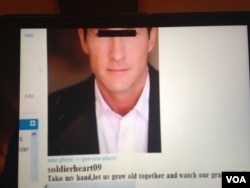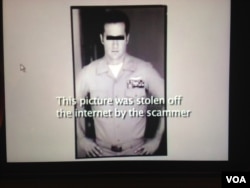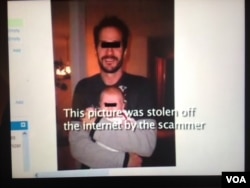Lilo Schuster was in her mid-40s, single, and looking for love. After years of bad luck with dating, she, like millions of people across the globe, started using online dating sites to meet new people.
A few years ago, she received what appeared to be a promising email on the dating site Match.com. The man told her that he was a U.S. Air Force pilot deployed to fight the Taliban in Afghanistan. He said he was a widower with an adorable daughter — the type of man and family that she'd been looking for, and most of all, he seemed very interested in Schuster.
“I just thought my prayers are being answered," she told VOA.
The relationship quickly intensified, and Schuster fell hard, emailing multiple times each day. He sent her poetry and page after page of emails professing his love. The man even sent her a few pictures dressed in his military uniform, and he was very handsome.
Schuster noticed that her suitor had bad grammar, but that didn't really bother her because her immigrant father had poor grammar as well. She asked to speak with him in person or via Skype, but the man said that wasn't allowed.
“His thing was, ‘well, this is top secret, we're fighting the terrorists, we can't do anything that would compromise that, so I can't use the phone.' And I believed all this," Schuster said.
After a few weeks, the man told her he needed some money to help his daughter go on a school trip. She loaned him about $2,000 by wiring the money to Britain, where he said his mother lived with his daughter.
Schuster was happy to help him, excited even.
“This is for our future,” she told herself.
The money requests didn't stop there. Shortly after the first wire transfer, the man told her that he wanted to get out of the Air Force and join some of his pilot friends in starting a private company that flies charter planes. She was told the military wouldn't let him access his bank accounts, so he needed her help to make his dream happen.
Schuster had her doubts, but said she was so scared that she might lose him that she was willing to keep wiring the money through Western Union. In all, she sent about $22,000, and almost immediately after she sent the last wire, he stopped emailing her.
“My heart just sank and I thought, this doesn't seem right,” she said.
Multi-million-dollar scamming industry
For Army Criminal Investigation Command spokesman Chris Grey, Schuster's story is all-too familiar.
“It's been just overwhelming. We are dealing with thousands of these,” he said.
Grey says he has personally spoken to women who've given more than $80,000 to someone that they've never met in person. His office has received calls from the United States, Japan, Britain and Australia — all from women who thought they were in love with a U.S. service member but were actually being duped.
Grey says many of these criminals work out of cyber cafes in west African countries such as Nigeria and Ghana. They steal soldiers' photos from social media, create a fake backstory and profile for the photographs and then target unsuspecting women on online dating sites.
The scams tend to pick up around the holidays, Grey said, so women dating online need to be careful.
“Trust your instincts. Never send money to someone that you've never met, never talked to on the phone,” he said.
Look out for inconsistencies
Grey told VOA there are several red flags to watch for when cyber scammers are looking for targets.
Look for:
~ Misspellings on the documents and capitalization errors.
~ Titles of organizations that don't exist. Grey said his office recently received a letter from the Sergeant of Arms for the "Senate Forces Command," but no such entity exists.
~ Mismatched logos. Citing an example, Grey told VOA that a scammer will sometimes send documents with U.S. Army logos, but that the dating profile may say the person is in the Navy.
~ Fake stories about frozen accounts or money for surgeries. The military does not freeze members' bank accounts or credit cards and provides health care for deployed service members.
~ Urgency to get off the dating site. Schuster said she was encouraged to use personal email immediately rather than the site. The faster the scammer is off the dating site, the lower the chances of being caught using a fake profile, according to Schuster.
Schuster turned her anger into action, and by sharing her story, she says she helped a woman in New Zealand and a fellow American in Boston discover that they were being duped. The scammer was using the same pilot story and the “same exact pictures” that were used with her.
If you suspect you're being scammed, do not send money abroad and contact local authorities or postal inspectors. They may be able to trace the emailer's IP address to stop the person from playing on women's emotions to steal their savings.







